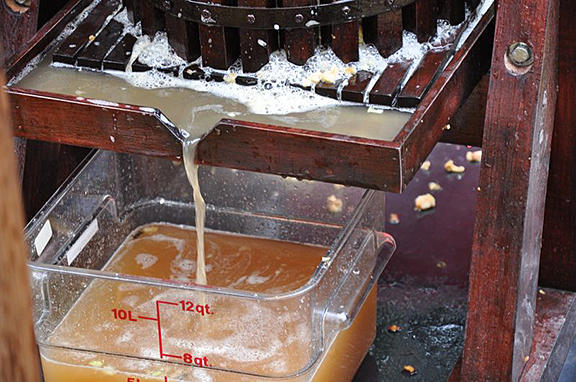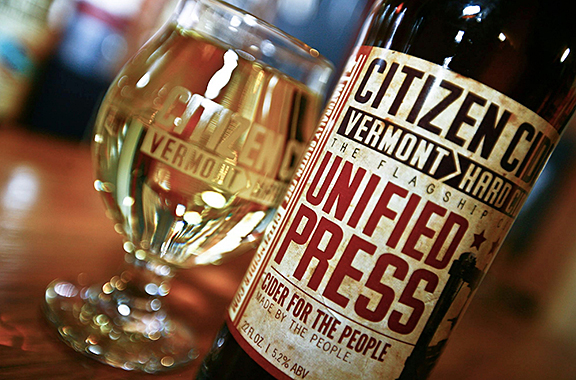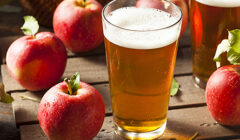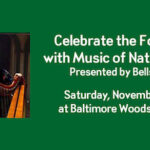Autumn Calls for Apples
…and apples call for hard cider! Tis the season to take a short pause from a summer full of craft beer and turn our attention and tastebuds to craft hard ciders.Ciders can be found in their own section these days in grocery stores and local beverage establishments and the different varieties available continue to grow exponentially. Lucky for us, we live in the heart of apple country and beyond our small region, the rest of the Northeast also produces massive amounts of apples that are transported throughout the rest of the country, for both consumers and cideries alike. Before we get too ahead of ourselves, let’s take a look at how hard cider is created!
 While truly any variety of apple can be utilized, most hard ciders are ranked from sweet to dry, just like wine. Therefore, different varieties of apples will yield different results along the scale. Apples have acids and tannins, just like grapes, which also contribute to the specific end product that is created. Apples are harvested when ripe and pressed for the juices. The fresh juice is then collected and placed into tanks, casks, vats, barrels, etc., where simple sugars in the apple juice are converted into ethanol by yeast; these yeast strains can be wild, but most are cultivated strains that are added by the manufacturers. Temperatures at which ciders are created vary anywhere from 60-75 degrees Fahrenheit. Eventually, the yeast is filtered out, and the liquid is strained and placed into a new container. Fermentation continues as it sits and carbon dioxide is created with the remaining sugars, thereby creating carbonation. Other flavors, juices and additives can be added during this process of fermentation as well; it’s not unusual to find hopped ciders, ciders with additions of honey, cranberries, grapes and even maple syrup! Fermentation can take anywhere from 3 months to 3 years and when it comes time to bottle, fermentation can still continue in the individual containers. As well, all ciders need to undergo the process of pasteurization to kill any harmful bacteria. Once the process is completed, the hard cider is ready for consumption!
While truly any variety of apple can be utilized, most hard ciders are ranked from sweet to dry, just like wine. Therefore, different varieties of apples will yield different results along the scale. Apples have acids and tannins, just like grapes, which also contribute to the specific end product that is created. Apples are harvested when ripe and pressed for the juices. The fresh juice is then collected and placed into tanks, casks, vats, barrels, etc., where simple sugars in the apple juice are converted into ethanol by yeast; these yeast strains can be wild, but most are cultivated strains that are added by the manufacturers. Temperatures at which ciders are created vary anywhere from 60-75 degrees Fahrenheit. Eventually, the yeast is filtered out, and the liquid is strained and placed into a new container. Fermentation continues as it sits and carbon dioxide is created with the remaining sugars, thereby creating carbonation. Other flavors, juices and additives can be added during this process of fermentation as well; it’s not unusual to find hopped ciders, ciders with additions of honey, cranberries, grapes and even maple syrup! Fermentation can take anywhere from 3 months to 3 years and when it comes time to bottle, fermentation can still continue in the individual containers. As well, all ciders need to undergo the process of pasteurization to kill any harmful bacteria. Once the process is completed, the hard cider is ready for consumption!
Most everyone who went to grade school in the United States has heard of Johnny Appleseed, (or John Chapman, which was his real name), but did you know that those famous seedlings of his during the late 1700s and into the early 1800s weren’t planted for the intention of eating, but instead planted with the intention of creating hard cider? You see, water wasn’t exactly the drink of choice in those early years of the Americas as it wasn’t always safe to drink, especially as settlers traversed the frontier to settle lands west of Pennsylvania. Cider was a much safer and more sanitary alternative and deemed an appropriate beverage for the whole family to consume.
Today, craft hard cider is growing as much in popularity as craft beer and with so many different and delightful variations to sample! To note, ciders are also naturally gluten-free, and therefore folks with specific allergies or food sensitivities have a golden opportunity to imbibe right alongside their beer-swigging friends.
There are a multitude of cideries in the greater CNY area where you can try different varieties of craft hard ciders, including:
- Indian Ladder Farms Cidery & Brewery, Altamont, NY
- Beak and Skiff Apple Orchards featuring their 1911 Established Ciders, Lafayette, NY
- Abbott’s Wine & Cidery, part of Abbott Farms, Baldwinsville, NY
- Critz Farms Brewing & Cider Company, Cazenovia, NY
- Grisamore Cider Works, Locke, NY
- Finger Lakes Cider House, Interlaken, NY
- New York Cider Company, Ithaca, NY
- South Hill Cider, Ithaca, NY
- Blackduck Cidery, Ovid, NY
- Fly Creek Cider Mill & Orchard, Fly Creek, NY (near Cooperstown, NY)
- Nine Pin Cider Works, Albany, NY
My friendly fall advice would be to take a scenic drive out to one of these establishments and let your palate discover something new. Additionally, your patronage supports these local, family businesses, which is even more important during this pandemic!
If you’re unable to get out to one of these cideries, or you’re looking for a 4- or 6-pack to pick up and drink during football games this season, then there are plenty of other options to purchase at your local supermarket. If you’re not sure where to start, here are a few of my personal favorites that are currently available.
Downeast Cider House’s Blackberry unfiltered craft cider, Boston, MA. (5% ABV)
This is a cider I am extremely fond of with its slightly tart fruited blackberry notes and crisp and refreshing nature, without being overly carbonated or overtly sweet. If you love berries, this is for you – It is downright delicious!
Nine Pin’s Peach Tea Cider, Albany, NY. (6.3% ABV)
The flavor is a blend of apples, peaches and tea leaves, slightly sweet, and presents on the lighter side. The apples are from Kinderhook’s Samascott Orchards and the cider is cold-infused with a custom peach tea blend from another Albany local business – Short and Stout Tea Company. A thoroughly enjoyable beverage! (Nine Pin also just came out with a very autumn-themed cider named Apple Pie-secco. I am anxious to try and get my hands on this!)
Citizen Cider’s Unified Press, Burlington, VT. (5.2% ABV)
Their flagship cider, this is a crisp, centered, off-dry and near-perfect traditional hard cider. No additives, just 100% apples and nothing else. An excellent choice if you want to keep it simple, but still keep it flavorful.
Cheers! 












